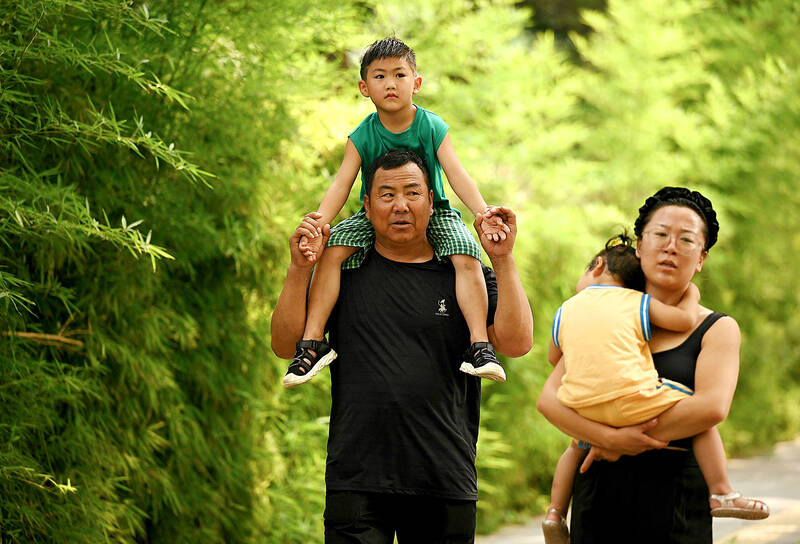A coming report on China’s population for last year is likely to post its first drop since the Great Famine in 1961, a profound shift with far-reaching implications for the global economy and world order, demographers said.
A glimpse of the scars caused by the pandemic to China’s already bleak demographic outlook could come to light on Tuesday, when it reports its official population data for last year.
New births for last year are set to fall to record lows, dropping below 10 million from last year’s 10.6 million babies, which were already 11.5 percent lower than in 2020.

Photo: AFP
“With this historical turn, China has entered a long and irreversible process of population decline, the first time in China and the world’s history,” University of California sociology professor Wang Feng (王豐) said.
“In less than 80 years, China’s population size could be reduced by 45 percent. It will be a China unrecognizable by the world,” he said.
China’s population increased by 480,000 to 1.413 billion in 2021.
The UN said that China’s population would begin a decline this year when India overtakes it as the world’s most populous country.
UN experts have predicted that China’s population would shrink by 109 million by 2050, more than triple the decline of their previous forecast in 2019.
While nine of the 10 most populous nations in the world are experiencing declines in fertility, China’s fertility rate of 1.18 last year was the lowest, and well below the accepted 2.1 standard for a stable population.
The Chinese National Health Commission China officially acknowledged it was on the brink of a demographic downturn last year, when it said the population could start declining before 2025.
Authorities since 2021 have introduced measures including tax deductions, longer maternity leave, enhanced medical insurance and housing subsidies to incentivize people to have more babies. The results so far has been lackluster.
Online searches for baby strollers on China’s Baidu dropped 17 percent last year and are down 41 percent since 2018, while searches for baby bottles are down more than a third since 2018.
Demographer Yi Fuxian (易福賢) said the proportion of Chinese aged 65 or older would reach 37 percent in 2050, from 14 percent last year and 5 percent in 1980, while China’s labor force would be depleted by declining births.
“Rapid aging is slowing China’s economy, reducing revenues and increasing government debt... China is getting old before it gets rich,” Yi said.
The COVID-19 pandemic has also had its affect on the willingness of Chinese to have families.
Living under China’s stringent restrictions for the past three years caused Shanghai e-commerce executive Zhang Qi enough uncertainty to consider not having children.
When China abruptly dismantled its “zero COVID” regime last month to let the virus spread freely, the balance tilted to a definite “No,” she said.
Stories about mothers and babies not being able to see doctors as medical facilities were overwhelmed by COVID-19 infections were the final straw for Zhang.
“I heard that giving birth at a public hospital is just horrific. I really wouldn’t consider having a baby,” the 31-year-old said.

MONEY GRAB: People were rushing to collect bills scattered on the ground after the plane transporting money crashed, which an official said hindered rescue efforts A cargo plane carrying money on Friday crashed near Bolivia’s capital, damaging about a dozen vehicles on highway, scattering bills on the ground and leaving at least 15 people dead and others injured, an official said. Bolivian Minister of Defense Marcelo Salinas said the Hercules C-130 plane was transporting newly printed Bolivian currency when it “landed and veered off the runway” at an airport in El Alto, a city adjacent to La Paz, before ending up in a nearby field. Firefighters managed to put out the flames that engulfed the aircraft. Fire chief Pavel Tovar said at least 15 people died, but

South Korea would soon no longer be one of the few countries where Google Maps does not work properly, after its security-conscious government reversed a two-decade stance to approve the export of high-precision map data to overseas servers. The approval was made “on the condition that strict security requirements are met,” the South Korean Ministry of Land, Infrastructure and Transport said. Those conditions include blurring military and other sensitive security-related facilities, as well as restricting longitude and latitude coordinates for South Korean territory on products such as Google Maps and Google Earth, it said. The decision is expected to hurt Naver and Kakao

THE TRAGEDY OF PUNCH: Footage of the seven-month-old Japanese macaque has gone viral online after he was rejected by his mother and formed a bond with a soft toy A baby monkey in Japan has captured hearts around the world after videos of him being bullied by other monkeys and rejected by his mother went viral last week. Punch, a Japanese macaque, was born in July last year at Ichikawa City Zoo. He has drawn international attention after zookeepers gave him a stuffed orangutan toy after he was abandoned by his mother. Without maternal guidance to help him integrate, Punch has turned to the toy for comfort. He has been filmed multiple times being dragged and chased by older Japanese macaques inside the enclosure. Early clips showed him wandering alone with

Australian Prime Minister Anthony Albanese yesterday said he did not take his security for granted, after he was evacuated from his residence for several hours following a bomb threat sent to a Chinese dance group. Albanese was evacuated from his Canberra residence late on Tuesday following the threat, and returned a few hours later after nothing suspicious was found. The bomb scare was among several e-mails threatening Albanese sent to a representative of Shen Yun, a classical Chinese dance troupe banned in China that is due to perform in Australia this month, a spokesperson for the group said in a statement. The e-mail